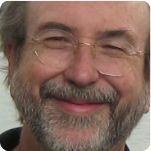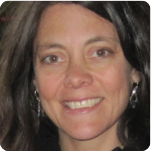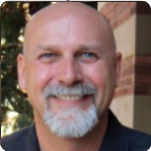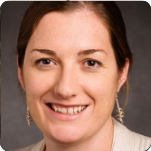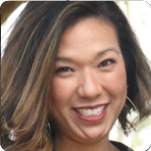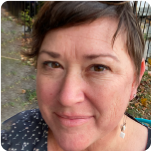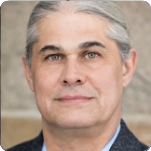February Expert Panel: Integrating Emerging Technologies into Teaching Practice
Overview Blog Playlist Expert Panel Discussion Resources Synthesis Brief
Recorded: Feb 10, 2021 at 4:00 PM Eastern Time
Description: This webinar explores three digital learning projects funded by NSF that utilize mixed reality, indoor location tracking, interactive collaborative surfaces, and ambient displays to support teaching and learning in STEM. Our panel of researchers and educators will discuss the development of these projects and the challenges faced and strategies employed by teachers when attempting to integrate these ambitious learning technologies into their classrooms. Come and join what promises to be a fascinating discussion between researchers and educators as they explore the future of STEM teaching. This webinar is co-moderated by Tom Moher and Wendy Martin. It is a collaborative effort with CIRCLS, the STEM for All Multiplex and the STEM Teacher Leadership Network (all funded by NSF).
Download: Webinar Chat
MODERATOR AND PANELIST BIOS
Moderators:
Tom Moher is an emeritus associate professor of Computer Science and Learning Sciences at the Learning Sciences Research Institute, University of Illinois at Chicago. Moher's research focuses on the design of learning technologies to support young classroom learners in their construction of understandings surrounding STEM domains, with a particular emphasis on the use of embedded and mobile technologies that afford embodied interaction and knowledge construction. He is best known as the creator of the "embedded phenomena" genre, which immerses learners in distributed spatial simulations that become the objects of collective inquiry
Wendy Martin is as a senior research scientist at Education Development Center. She has been principal investigator on a number of large-scale NSF-funded projects that use a collaborative co-design approach with program developers, practitioners, and researchers to achieve a common goal. She is currently PI on a project focused on co-creating a maker/engineering out-of-school-time (OST) program for autism inclusion settings New York City with educators, OST program developers, and experts in autism inclusion. She also led a project that co-created digital design career pathways for minoritized youth with stakeholders from OST programs and higher education. Dr. Martin is also a part of the NSF-funded Center for Integrative Research in Computing and Learning Sciences (CIRCLS) Resource Center, and works on projects funded by NASA and the LEGO Foundation.
Panelists:
Noel Enyedy is a professor in Teaching and Learning at Vanderbilt University. Enyedy studies social interaction in the classroom and how technology can be used to spark and support productive learning conversations. Recently, Enyedy’s work has been focused on creating augmented and mixed reality environments as playful spaces for elementary science education
Emma Mercier is an associate professor in Curriculum and Instruction at the University of Illinois Urbana Champaign and director of the Collaborative Learning Lab (www.colearnlab.org) Mercier’s work focuses on the role of social interaction in learning, collaborative learning in classrooms and how technology can be used to support students and teachers engaged in collaborative learning. Mercier is interested in how new technologies and methods can help us gain insight into learning and interaction processes, and be used to provide live feedback to students and teachers
Noelani Ogasawara Morris has been a Demonstration Teacher at the UCLA Lab School for 13 years. During her teaching career, she has taught at the Primary and Intermediate levels of elementary school. As a Demonstration Teacher at the Lab School, Noelani teaches in a multi-age community of learners in collaboration with her teaching partners. She has a passion for inquiry and mathematics and also currently works with the UCLA Math Project, leading professional development for teachers in the Los Angeles Unified School District with a focus on incorporating Cognitively Guided Instruction based practices into their math curriculum. Throughout her years as a lab school teacher, Noelani has cherished the opportunities to collaborate with researchers at UCLA in inquiry-based practices that delves deeply into the minds of her students, using their voices, documentation, and dialogue to guide their learning and make curricular decisions.
Johanna Thompson is a Science and Humanities teacher, 6th-grade advisor, and the Diversity, Equity, & Inclusion Coordinator at Bernard Zell Anshe Emet Day School in Chicago. She spent 7 years as a middle and high school history teacher at The Pilgrims School in Los Angeles, a year abroad at the American School of Costa Rica, and 8 years in informal education at The Field Museum of Chicago before returning to the classroom. Over the course of her career, she's leveraged both digital and hands-on tools to connect students to content believing that whether virtual or IRL, sometimes the best classroom is anywhere but the classroom. Johanna is also a nationally trained SEED facilitator, working to expose systems of privilege and empower folks to dismantle the false hierarchy of human value that is at work in our lives.
Jim Slotta holds the President’s Chair in Knowledge Technologies at the Ontario Institute for Studies in Education (OISE), University of Toronto. His team investigates new models of K-12 STEM inquiry, including powerful new roles for technology-enhanced learning environments. These studies have advanced a pedagogical model known as Knowledge Community and Inquiry (KCI), in which students and teachers collaborate as a learning community to engage in STEM inquiry projects. KCI activities are scaffolded by smart classrooms and distributed learning environments, in which students develop a shared knowledge base that supports their inquiry. Slotta directs the ENCORE lab (http://encorelab.org) in which KCI curriculum and technology environments are developed and researched.
